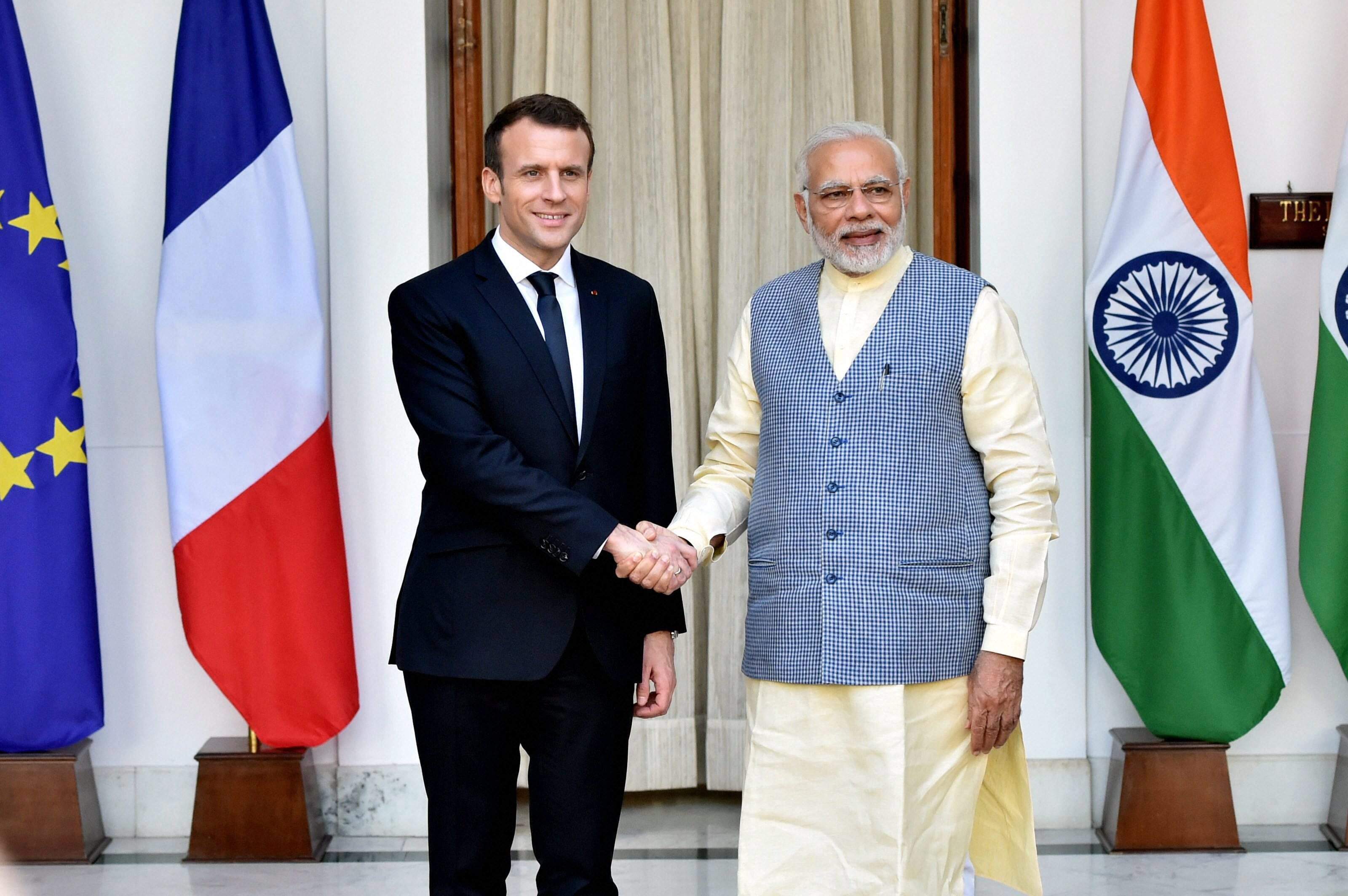
INDIA-FRANCE STRATEGIC PARTNERSHIP 2.0
The visit of French President Emmanuel Macron to India from 9-12 March 2018 provided an opportunity for stock taking of the two decade old strategic partnership. The need to enhance and reset the Indo-French Strategic Partnership 2.0 was necessary with the changing power equations at the regional and global level.
India and France have had a valued relationship that has grown to accommodate each other’s concerns. The current visit has produced major agreements that span the political, security, economic, trade, energy and civil society sectors. Unlike the seven day visit of the Canadian Prime Minister Justin Trudeau in February, PM Modi spent a substantial amount of time with President Macron and the contrast was very stark and optically visible.
The Modi treatment was also on display with numerous photo ops beginning with the Prime Minister personally receiving the guest at the airport. In 2017, Modi visited Paris shortly after Macron became President and there was a feeling of good chemistry between both leaders. While personal chemistry is important, translating that into a political output is crucial and this is where the current visit seeks to build on that rapport and scale up the bilateral engagement.
Enhancing the Political–Strategic Partnership
Modi wants France to invest in India's growth and development through his governments flagship initiatives - Make in India, Skill India and Smart Cities. Both sides agreed to hold biennial summits and also concluded an Agreement regarding the Exchange and Reciprocal Protection of Classified or Protected Information. Seen in the context of the fight against terrorism, this will be a useful instrument of bilateral cooperation.
Given that India wants to enhance and build the defence engagement, this aspect was given a boost with the starting of a ministerial level annual defence dialogue. This assumes importance as India has been especially looking for transfer of technology in defence sector. Modi will push for enhancing the India portfolio of France and to get Paris to stand with it on critical regional and international issues. PM Modi thanked France for enabling India’s accession to all critical regulatory bodies in the domain of nuclear non- proliferation - the MTCR in June 2016, to the Wassenaar Arrangement in December 2017 and to the Australia Group in January 2018.
A significant convergence of interests between Delhi and Paris was underlined by the Agreement that provides for reciprocal logistics support between the Armed Forces and regular joint military exercises. The intensification of joint exercises between all three defence sectors acknowledges that France is becoming a growing defence partner. The second Varuna naval exercise in India has begun in March and will continue till May 2018. This comes on the heels of the Varuna naval exercise held in France in April 2017 and the Shakti army exercise held in France in January 2018. The next Garuda air force exercise will take place in France in 2019. The French role in the indigenisation and manufacture of weapons systems and hardware acquisition has become even more important given the developments in South east Asia. INS Kalvari, the first Scorpene submarine made in India by Mazagon Dock Shipbuilders Ltd. Was done in collaboration with the French shipbuilder Naval Group.
The political and strategic content of the partnership has seen a significant enhancement. India’s aversion to sharing military resources and in this instances the use of naval bases on both sides indicates the jettisoning of mindset in Delhi that had a strong aversion to overt alliance building. "Defence cooperation between the two countries now has a new significance," Macron said. "A strong part of our security and the world's stability is at stake in the Indian Ocean and ... The Indian Ocean, like the Pacific Ocean, cannot become a place of hegemony," he added in a obvious reference to China. Under the deal, India and France will open their naval bases to warships from each other, a move seen as an attempt to undermine China's territorial ambitions.
In a major shift, India is seeking to strengthen its presence in the Indian Ocean. This is of critical consequence to strengthen the Indian footprint and presence and counter the Chinese growing maritime influence in the Indian Ocean and strengthen the Indo-Pacific engagement through a framework of bilateral cooperation. Reconfiguring the bilateral relation to the changing geopolitical shift in the Indian Ocean signals a convergence of interest on both sides. The leaders reiterated the “safety of international sea lanes for unimpeded commerce and communications in accordance with the international law, for countering maritime terrorism and piracy, for building maritime domain awareness, for capacity building and for greater coordination in regional/international fora in the region”.
Climate Change and Clean Energy
Climate and environment has assumed priority in the expanding bilateral cooperation. India has affirmed to stay in the Paris accord as attention has shifted to other countries since Trump pulled America out of climate regime. In this context the launch of the International Solar Alliance and the inauguration of a solar power plant in UP signalled not only clean energy but the Climate accord commitment of India. Strengthen the civil nuclear partnership in the power sector - Jaitapur project and strengthen space collaboration, were two other agenda items.
France and India seek to enhance the Partnership
The French President’s visit also had multiple objectives as evidenced by the meetings that had been lined up. Strengthen the strategic partnership, and bring projects and benefit from India's growing economic presence, but also partner it for the future. Enhance the business exposure on both sides and the business delegation coming with him is a signal of this intention through the CEO meeting. On the other hand getting the long awaited Rafale aircraft inducted into the air force gained more attention, but for President Macron this was disappointing as it did not translate into additional orders. France reiterated its support for Macron was also looking to learn about India and engaged the youth through a town hall India’s candidature for a permanent membership of the UN Security Council meeting. At the civil society level, enabling a generation of students to benefit from studying in the other country through recognition of degrees will be an attempt to intensify the connection between both societies. On the final day of his visit, President Macron’s visited Modi’s constituency-Varanasi and took part in the Clean Ganga mission and both leaders also under took some river diplomacy.
Conclusion
Taking the bilateral relation from a position of no- differences between New Delhi and Paris to seeking convergence of interests on certain strategic issues signals a maturing of the strategic partnership over two decades and building a bilateral platform in the face of growing disruptions coming from China, Russia and the US.
Keywords: India, France, Strategic Partnership, Defence, Indian Ocean, Climate

Prof. Dr. Ummu Salma Bava is Chairperson and Professor of European Studies at the Centre for European Studies, School of International Studies, Jawaharlal Nehru University, New Delhi, India.

EUROPEAN UNION’S GENERAL DATA PROTECTION REGULATION:
PRIVACY BY DESIGN AND DEFAULT
Privacy in the digital age is no more a myth after 25 May 2018. The European Unions’ (EU) General Data Protection Regulation (GDPR) is an outcome of two decades of EU regulatory revolution that has set the benchmark for the creation of a European online data protection regime with global implications. The GDPR has 173 Paragraphs, 11 Chapters and 99 Articles that underlines the entire gamut of individual privacy and online data protection issues in a networked world. The significance of the regulation is that it regards ‘data as a natural entity’ and protects the rights of the individuals, whose data was collected, stored and used by both the state but more so by businesses in all probable ways. This issue was clearly amplified by the recent revelations of the misuse of Facebook data by Cambridge Analytica.
The Second Para of the GDPR has clearly underlined the core concerns with respect to personal data, “the principles of, and rules on the protection of natural persons with regard to the processing of their personal data should, whatever their nationality or residence, respect their fundamental rights and freedoms, in particular their right to the protection of personal data.” (EC 2016).
In a digital era, data has become ‘the driver and the power’ of the networked world, however, protection, use and misuse of online data emerged as paramount concerns at the level of individuals, society, policymakers and businesses. To address rising data security and misuse concerns, the EU adopted the GDPR in 2016 and gave a two year period till 25 May 2018 for all EU Member States and businesses to comply with the new regulations. During the last 30 years, this is the most significant development that has happened in the global digital discourse for data protection and individual privacy. The key features of the DGPR are: awareness, consent, expanded scope, individual rights, access requests, privacy by design, transparency, accountability, data protection officers and penalties. The GDPR compliance will further encourage the idea of ‘data hygiene’ among stakeholders, which will enable a culture of error free or clean data. The regulation is intended to safeguard data and simultaneously further boost the process of the European digital integration and enhance the digital single market and in creating a European data economy across the Union.
The GDPR identifies two types of data - personal data which can identify the individual and non-personal data. The expansion of the tech industry and the growth of the digital economy have resulted in large amounts of personal data collection and storage, which has been gradually monetised in the name of better service deliverables. In the process, the matter of individual privacy has been ignored and often overlooked in data collection and sharing information with third parties that have serious political, economic, security and social ramifications and concerns.
Data Collection and Management: Consent, Accountability and Penalty
At the heart of the new regulation is the crucial aspect of the consent of the individual (informed, specific and unambiguous) for data collection and accountability on the part of the data processor. Article 25 of the GDPR has made it obligatory for all the stakeholders to put in place ‘data protection’ by design. The seriousness of protecting such data is evident from the description under Article 83 of the penalties in case of infringements that amount “up to 10,000,000 EUR, or in the case of an undertaking, up to 2 percent of the total worldwide annual turnover of the preceding financial year, whichever is higher” (EC 2016: 82). Likewise, non-compliance also invokes strong penalties, all of which draws attention to the liability which rests with an organisation on the collection, storage, use and sharing of online data. In addition, the GDPR has adopted security techniques like ‘pseudonymisation’ to protect Personally Identifiable Information (PII) from hacking or data leaks like those which happened in cases like Equifax or Ashley Madison in 2015.
At the core of the GDPR is the protection of the individual’s rights with respect to their personal online data. The new regulation thus provides large set of rights to EU residents such as, “Right to be informed about the personal data organizations have about them; Right to access personal data; Right to rectification – correct errors in personal data or add to incomplete records; Right to erasure (“the right to be forgotten”); Right to restriction on processing of personal data; Right to data portability; Right to object to the processing of personal data (EC 2016). Second, Article 28 has talked about ‘data collection’, ‘data transfer’ and ‘data flows’ to third party. Herein lies the major challenge to foreign companies such as Facebook, Google, or any Indian company which want to have business within the EU as they are now required by law to comply with the GDPR. The regulation seeks to enhance industries’ and businesses responsibility and accountability towards its consumer given that most of the earlier privacy laws were weak on compliance and penalties.
The big challenge is that the Member States and the businesses are not yet fully DGPR compliant. As the regulation comes into force, some countries like Germany which had good privacy laws are ahead of the curve, but for many businesses across the EU, adapting to the new regulation is a never-ending nightmare. Between consent, compliance, and redressal of the breach of data there is a wide gap between the existing and created capability EU wide and what the regulatory framework sets as standards.
In a digital and networked world, where bots, trolls, and disinformation are already challenging liberal democratic societies, GDPR has vested significant responsibilities on data protection officers, industries and researchers to make the digital world safe and create transparency in the way data is handled and prevent the misuse of personal data. The GDPR can be seen as ‘rules of engagement’ developed by the EU to address the challenges posed by growing technologies and processes like Internet of Things and Artificial Intelligence for the Union, but with global spill over effects. The implementation of the GDPR will make the EU a more robust cyber power and actor and a pioneer especially with regards to online data creation, access and protection. Living in an Orwellian world, where every online activity and interfaced everyday life that produces data can be watched, tracked and stored, the GDPR seeks to be the gatekeeper of individual privacy, however, the challenge for the EU is 100 percent compliance.
Keywords: EU, GDPR, Data protection, privacy, individual rights and penalties


Prof. Dr. Ummu Salma Bava, Chairperson & Jean Monnet Chair and Jayadev Parida, Ph.D. Scholar, Centre for European Studies, SIS.